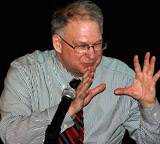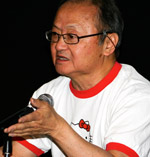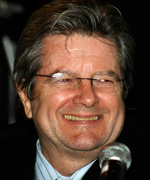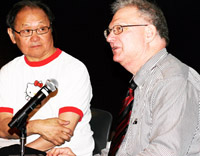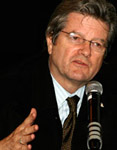|
The widespread adoption of computer-based methods of digital recording technology has profoundly changed film scoring practices around the globe, not least in Hollywood. This panel will explore those changes with attention to current techniques compared to those of past generations. Our speakers, Paul Chihara of UCLA and Dan Carlin of the Berklee College of Music, are widely respected professional film scorers as well as teachers. Drawing on their own experiences in film production, they will explore the decisive changes in personnel, economics, and stylistic values at work in Hollywood today. Moderator Martin Marks of MIT will provide historical perspectives and guide the discussion with questions for the panelists concerning the music of landmark films past and present. An audio recording of Film Music and Digital Media is now available. A video of Film Music and Digital Media is now available. Text by Helene S. Moorman, photos by Greg Peverill-Conti
Moderator Martin Marks summarized the history of sound in film by describing three revolutions: the coming of sound recording to film in the 1920s; the birth of sound design as an integral creative part of film-making in the 1970s; and current innovations occurring due to digital technology. These latest changes, he pointed out, will continue indefinitely as technology improves. Marks presented a clip from the 1933 film King Kong. The scene showed Kong's first appearance in the movie, and was heavily reliant on music and sound effects.
Paul Chihara said that the musical style in King Kong and many other films of the same era was inherited from the classically trained Jewish composers who fled Germany in the 1930s. Chihara showed a series of clips of the same scene from Peter Jackson's recent version of King Kong. The sequence illustrated the process of film scoring by displaying some of the intermediary steps in the transformation of raw visuals into a finished scene.
Dan Carlin applauded the fact that the King Kong scene hadn't utilized a temp score (a digital score created by the music editor from existing music for early drafts of the film). He described a problem known as demo love, in which a temp score is created for early screenings of a film and the filmmaker falls in love with it, compelling the composer to write a score that sounds similar. This practice causes many film scores to sound alike. Marks said that certain directors use temp tracking to impose their authority over every aspect of the film. New digital technology has made this simpler by granting easy access to libraries of great scores. Chihara agreed, saying that directors now often work directly with film editors to create their own temp tracks. He also noted that the kinds of music popular in film today lend themselves to temp tracking because they are easy to edit on the computer. Carlin related an anecdote about the composer Georges Delerue, who went to see the film The Color Purple and noticed his own theme in the music. It turned out his score had been used in the temp score. It was so close that Delerue sued and won. Chihara said that many of his colleagues were worried about the demo love problem. They want their demos to be impressive, but if they're too good the demo might become the final score. According to Carlin, that very thing happened at Paramount about four years ago. The producer of the Star Trek series asked the composer for mockups of the music. He liked what he heard so much that he took the orchestra out of the budget and used the demo as the final product. Marks pointed out that economic realities are contributing to this problem. Films today have so much money riding on them that the producers are afraid to take risks. Q & A Question: How can one tell the difference between an electronic score and an acoustic score? Carlin: It gets harder all the time to tell the difference. Acoustic has a warmer sound, but as music software improves, the electronic sound gets closer and closer. Chihara: The sound samples used to create digital scores are acoustic to begin with, and a composer can tweak those samples to his liking before using them. Question: Is it common for composers who come from the world of rock and roll like Danny Elfman to use orchestrators to create their film scores? Chihara: Yes, many composers now have orchestrators because they don't have the formal training to do it themselves. I'm a classically trained conductor, but I don't teach those skills to my students now because technology has made them unnecessary. Question: At what point in the film-making process does the scoring actually begin?
Marks: I doubt there's a fixed answer. A lot of composers say they start jotting down ideas well before the actual scoring. But until the spotting session (formal meeting with the composer, director, film editor, and music editor), there's a limit to what they can do. Carlin: Several folks have told me they're not even having spotting sessions anymore. Instead, the director will give them a scene with some temp music in it and just have them start working on it. Question: What type of exercises do you give your students to prepare them for working in the industry? Carlin: We emphasize that it's not about the music, it's about the film. Your job as a composer is to make your music fit the film and please the director. In my class we have students write cues and then the other teacher and I will comment on their work. Sometimes we disagree, which can happen with different directors in real life. Chihara: My approach is to team my film scoring students with student filmmakers from the film department and have them score an entire picture. Music is part of the drama, and it's important to conceptualize how you want it to operate through the whole film rather than writing individual cues. Question: How do you feel about the interaction between film music and video game music? Chihara: Gaming is swallowing up our industry. I've never done a video game, but I'd like to. They have huge budgets. Carlin: People spent more money last year on video games than on any other form of entertainment. We have a video game music club at Berklee. It started in 2007 with fourteen people, and within a year grew to one hundred members. I'm concerned about the fact that there aren't enough jobs for all the people we're training, so I think it's good that this is another option that exists out there.
When I looked into video game music five years ago, I found very little I wanted to listen to. It's still an evolving language. It seems like every three months I see an article claiming something is the Citizen Kane of video games. It took 50 years to make Citizen Kane and another 20 before it was appreciated. I think they're jumping the gun. Games have been a part of human culture forever, and what are the best games that have been created? Maybe chess or bridge. Can we ever think of those as narratives that can move us and reflect human experience? Marks: One of the key points that's come out here is that game developers want acoustic sound in their games. When you run an animation without music, you become more aware of the frames. The music makes it more real. For a long time sound effects were emphasized over music because of the challenges of creating interactive scores, but there will be breakthroughs very soon. My only concern is that people are so quick now to hail the masterpiece without considering that sometimes the best things take time to be appreciated. |
|||

